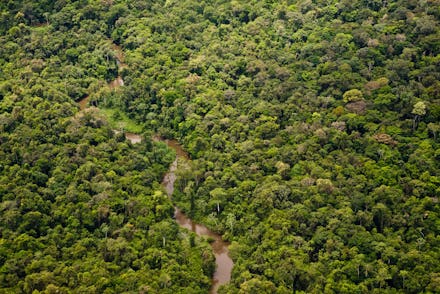The Amazon rainforests are trapped in a vicious cycle of drought and death, study shows

The Amazon is an immense region that includes 1.4 billion densely forested acres and is home to 10% of the Earth's recorded species. It's also in serious danger.
According to a new study published Monday in Nature Communications, the Amazon rainforests are trapped in a perilous self-perpetuating cycle of drought and destruction. Less rainfall leads to more deforestation, and more deforestation leads to less rainfall, and so-on.
Unsurprisingly, humans are to blame.
The findings don't point to "complete Amazon dieback" by the end of the 21st century, but "they suggest that frequent extreme drought events have the potential to destabilize large parts of the Amazon forest," the researchers wrote.
The study looked closely at self-perpetuating forest loss that had already been reported, and found that the delicate balance of the Amazon water cycle is dangerously under threat — all thanks to humans.
Water should be evaporating from the trees in the rainforest and then falling back down onto them in the form of precipitation, but that process is being interrupted by human activities, like logging, study co-author Henrique Barbosa of the Universidade de Sao Paulo in Brazil said in a statement. The water cycle is delicate, and human activity is standing in the way of the forests' ability to keep itself alive and healthy.
Human activity is harming even the parts of the Amazon that aren't directly affected by deforestation, Barbosa said.
But why should the rest of us care what happens in the Amazon? Aside from being a vast natural wonder, the Amazon affects the rest of the globe.
According to the World Wildlife Fund, there is "a clear link between the health of the Amazon and the health of the planet." The Amazon forests contain billions of metric tons of carbon; if its trees are destroyed, that carbon would be released into the atmosphere, further heating up the climate and creating "catastrophic consequences" for the planet.